
The 72nd Air Base Wing is a United States Air Force unit assigned to the Air Force Sustainment Center at Tinker Air Force Base, Oklahoma. It has been the host unit at Tinker since activating there on 1 October 1994.

The 451st Air Expeditionary Group was a provisional United States Air Force USAFCENT unit. It was assigned to Kandahar Airfield and is also the host unit at Kandahar. It reported to the 455th Air Expeditionary Wing at Bagram Air Base.

The 75th Air Base Wing is a wing of the United States Air Force based out of Hill Air Force Base, Ogden Utah. It provides base operating support for the Ogden Air Logistics Complex, the 388th, 419th Fighter Wing, 84th Combat Sustainment Wing, 309th Maintenance Wing, 526th ICBM Systems Wing, 508th Aircraft Sustainment Wing and 25 associate units.
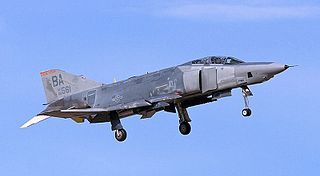
The 91st Cyberspace Operations Squadron is an active United States Air Force unit, currently assigned to the 67th Cyberspace Wing at Kelly Annex, part of Lackland Air Force Base, Texas.

The 119th Fighter Squadron is a unit of the New Jersey Air National Guard 177th Fighter Wing located at Atlantic City Air National Guard Base, New Jersey. The 119th is equipped with the F-16 Fighting Falcon aircraft and is the oldest active flying fighter squadron in the Air National Guard.
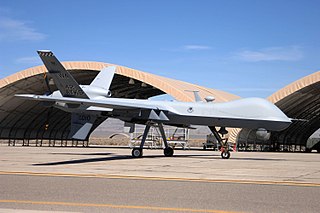
The 432nd Wing is a United States Air Force unit assigned to Air Combat Command at Creech Air Force Base near Indian Springs, Nevada. It flies General Atomics MQ-9 Reaper and RQ-170 Sentinel Unmanned aerial vehicles.
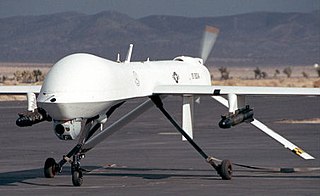
The 18th Attack Squadron is a squadron of the United States Air Force. It is assigned to the 432d Operations Group, and has been stationed at Creech Air Force Base, Nevada since 2009. The squadron conducts strike, intelligence, surveillance and reconnaissance missions, operating the General Atomics MQ-1 Predator unmanned aerial vehicle.

The 314th Air Refueling Squadron is an active United States Air Force unit within the Air Force Reserve Command. It is currently assigned to the 940th Air Refueling Wing, based at Beale Air Force Base, California. It was inactivated on 1 July 2009 and reactivated on 1 June 2016.

The 69th Reconnaissance Group is an inactive United States Air Force that was part of Air Combat Command, the group was stationed at Grand Forks Air Force Base, North Dakota where it was a tenant of the 319th Air Base Wing.

The 427th Reconnaissance Squadron is an active United States Air Force (USAF) unit assigned to Beale Air Force Base, California.

The 41st Electronic Combat Squadron is a United States Air Force unit. Its current assignment is with the 55th Electronic Combat Group at Davis–Monthan Air Force Base, Arizona as a geographically separated unit from its parent wing, the 55th Wing at Offutt Air Force Base, Nebraska. It operates the Lockheed EC-130H Compass Call communications-jamming aircraft.

The 101st Bombardment (Photographic) Squadron is an inactive United States Air Force unit. It was last assigned to the XIX Tactical Air Command, based at Brooks Field, Texas, in 1944. It was inactivated on 25 December 1945.

The 43d Electronic Combat Squadron is a United States Air Force unit. Its current assignment is with the 55th Electronic Combat Group, being stationed as a tenant unit at Davis-Monthan Air Force Base, Arizona as a geographically separated unit from its parent, the 55th Wing at Offutt Air Force Base, Nebraska. It operates the EA-37B communications-jamming aircraft.

The 395th Tactical Missile Squadron is a United States Air Force unit. It has not been active under that name.

The 489th Attack Squadron is an active United States Air Force unit, stationed at Creech Air Force Base, Nevada, and operating MQ-1 and MQ-9 unmanned aerial vehicles. It was active at Beale Air Force Base, California as the 489th Reconnaissance Squadron from 2011 to 2015.
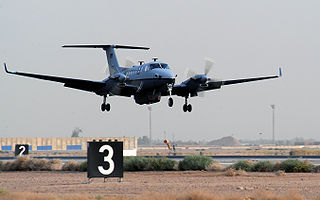
The 361st Expeditionary Reconnaissance Squadron is a provisional United States Air Force unit. It was most recently assigned to the 451st Air Expeditionary Group at Kandahar Airfield, Afghanistan, where it was inactivated on 1 September 2014.

The 622d Expeditionary Air Refueling Squadron is a provisional United States Air Force unit, assigned to United States Air Forces Europe to activate or inactivate as needed. The squadron was first established during World War II as the 22d Photographic Reconnaissance Squadron. It served in the European Theater of Operations, where it earned a Distinguished Unit Citation and a French Croix de Guerre with Palm for its actions in combat.
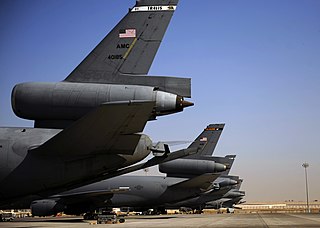
The 908th Expeditionary Air Refueling Squadron is a provisional United States Air Force (USAF) unit. It is assigned to the 378th Air Expeditionary Wing at Prince Sultan Air Base in Saudi Arabia. It has supported combat operations in the War in Afghanistan (2001–2021), Iraq, and Syria from its previous location of Al Dhafra Air Base in the United Arab Emirates. The squadron has a varied background, having been formed by a series of consolidations of no fewer than five distinct units.

The 21st Expeditionary Reconnaissance Squadron is a provisional United States Air Force unit, assigned to United States Air Forces Europe to activate or inactivate as needed. Its last known location was at Souda Bay, Greece.

The 62d Expeditionary Attack Squadron is a provisional United States Air Force unit. It is a provisional squadron of Air Combat Command, attached to the 432d Air Expeditionary Operations Group, stationed at Creech Air Force Base, Nevada. The primary mission of the 62d EATKS is to launch and recover all the Air Force Remotely Piloted Aircraft in Afghanistan.






























